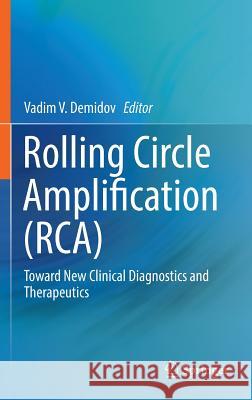Rolling Circle Amplification (Rca): Toward New Clinical Diagnostics and Therapeutics » książka
topmenu
Rolling Circle Amplification (Rca): Toward New Clinical Diagnostics and Therapeutics
ISBN-13: 9783319422244 / Angielski / Twarda / 2016 / 176 str.
Kategorie:
Kategorie BISAC:
Wydawca:
Springer
Język:
Angielski
ISBN-13:
9783319422244
Rok wydania:
2016
Wydanie:
2016
Ilość stron:
176
Waga:
4.20 kg
Wymiary:
23.5 x 15.5
Oprawa:
Twarda
Wolumenów:
01
Dodatkowe informacje:
Wydanie ilustrowane











